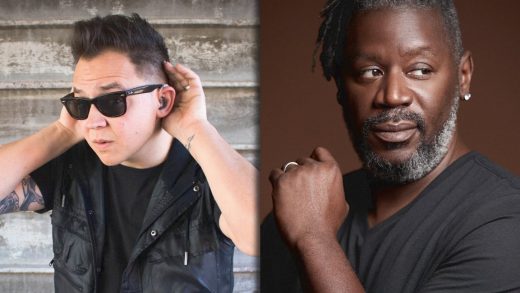Deaf rappers Warren Snipe and Sean Forbes will perform with Eminem and Dr. Dre at the Super Bowl halftime show
In 2018, an American Sign Language (ASL) interpreter went viral as she performed alongside Eminem at Delaware’s Firefly Music Festival. Holly Maniatty captivated viewers with her fast-paced interpretation of Eminem’s frenetic “Rap God,” which holds a Guinness World Record for most words in a song, at 1,560—including a section with a rapid rate of 6.46 words per second—demonstrating the incredible dexterity needed to sign-rap for the deaf and hard of hearing.
Already common at music festivals like Bonnaroo and Lollapalooza, ASL rap is now coming to Sunday’s Super Bowl LVI halftime show. As the Rams play at their L.A. home stadium against underdogs the Bengals, the NFL has handed the halftime reins to city native Dr. Dre, who’s recruited to the stage fellow Angelenos Snoop Dogg and Kendrick Lamar, longtime protégé Eminem, and frequent collaborator Mary J. Blige.
The lineup of rap veterans seemed an ideal opportunity to cross another musical landmark this year: showcasing “dip-hop,” or hip-hop embodied by deaf artists. For the first time ever, thanks to Warren “Wawa” Snipe and Sean Forbes, ASL signing of the main performances will be provided for deaf and hard-of-hearing viewers. The milestone comes after a 15-year push by the country’s leading deaf organization to persuade the NFL to make the star-studded events more accessible and inclusive.
Snipe, who coined the term dip-hop, grew up wanting to understand hip-hop even though he couldn’t from a traditional sonic manner. He’s described how his sister would write down the lyrics and lip-synch them for him. Forbes is a Detroit rapper who most recently had success with his 2020 album Little Victories. (The Detroit Free Press reported that Forbes had the opportunity to show Eminem his version of the 8 Mile track “Lose Yourself” at a Michigan studio in 2005.)
It’s unclear whether that Detroit connection catalyzed the move, or what role the performers had, if any, in the decision. But it was principally down to the work of the National Association of the Deaf (NAD), which has been pushing the NFL on the issue for 15 years, says Howard Rosenblum, the organization’s CEO, over email, “to continue elevating accessibility and showcasing the beauty of ASL at the Super Bowl.” The NAD’s work has led to ASL-signed national anthems in previous years; this year, the organization saw a chance to propose Snipe and Forbes specifically.
Rosenblum stresses that Snipe and Forbes are not interpreters but rather performers in their own right. “Their goal is to make music accessible and visually appealing in ASL while synchronized with the musical performance as it happens,” he explains. Forbes cofounded the Deaf Professional Arts Network (D-PAN), which illustrates this demanding talent, for which performers do ASL versions of pop hits, including ones by Eminem, Christina Aguilera, and the White Stripes.
How deaf and hard-of-hearing people experience music—especially hip-hop, which relies heavily on percussive beats and rhythmic lyrics—varies among individuals, some of whom can hear beats and lyrics, some only beats, and some who rely on “ASL portrayal as the visual equivalent of hearing the music,” Rosenblum explains. For this reason, the signing must be expressively visual.
The optical eloquence of the art form was clear when Snipe signed the national anthem at last year’s Super Bowl as it was performed by Eric Church and Jazmine Sullivan. According to The Washington Post, he had to translate the lyrics to ASL and study the artists’ facial expressions “to make sure he conveyed every word accurately.” This year, deaf actress Sandra Mae Frank will perform the anthem alongside country singer Mickey Guyton.
Then, at halftime, comes the main event. The artists have remained coy about the set list, so it’s unclear on what songs the ASL rappers will be lending visual aids. Will we see them perform throwback hits like “The Real Slim Shady” or iconic collaborations like “Forgot About Dre”? (Viewers tuning in to ASL versions will be able to stream them live on NBCSports.com and the NBC Sports app.) Whatever the case: “This kind of access brings a sense of inclusion and equality to our community,” Rosenblum says, adding that he hopes its success will make it an annual feature—and a model for other events to follow.
Fast Company , Read Full Story
(50)



